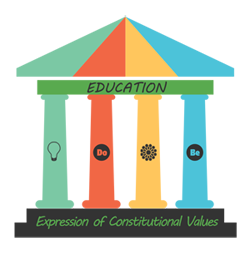According to the UNESCO, education should be based on four pillars: learning to know, learning to do, learning to live together and learning to be.

- Learning to Know:
 This means that individuals should have a sufficiently broad general knowledge as well as access to opportunities to specialize in selected subjects and explore them to the optimum level. This also means learning to learn, so as to benefit from the opportunities education provides throughout life.
This means that individuals should have a sufficiently broad general knowledge as well as access to opportunities to specialize in selected subjects and explore them to the optimum level. This also means learning to learn, so as to benefit from the opportunities education provides throughout life. - Learning to Do:
 This means that individuals should acquire not only an occupational skill but also, more broadly, the competence to deal with many professional situations in life. It also means learning to work effectively and efficiently in the context of various work spaces.
This means that individuals should acquire not only an occupational skill but also, more broadly, the competence to deal with many professional situations in life. It also means learning to work effectively and efficiently in the context of various work spaces. - Learning to Live Together:
 This means that individuals should develop an understanding of one another and learn to appreciate the interconnectedness and interdependence of all created beings in the cosmos.
This means that individuals should develop an understanding of one another and learn to appreciate the interconnectedness and interdependence of all created beings in the cosmos. - Learning to Be:
 This means that people should be able to mould their character by a process of self-discovery of their innate potential resources. Character gains through its expression and loses through its repression. Understanding the true nature and potentials of oneself enables expansion of the person both as an individual and as a member of the society.
This means that people should be able to mould their character by a process of self-discovery of their innate potential resources. Character gains through its expression and loses through its repression. Understanding the true nature and potentials of oneself enables expansion of the person both as an individual and as a member of the society.
Our current educational system has been mainly based on the first two of the above-mentioned aspects, namely, learning to know and learning to do. But the third and fourth pillars—learning to live together and learning to be—are greatly relevant today as we live in a fast-changing world, often torn apart between cultural conflicts among people and communities. A value-integrated educational system is therefore, the need of the hour.


